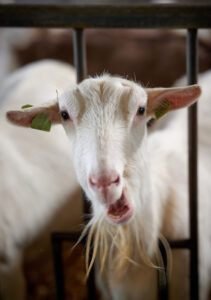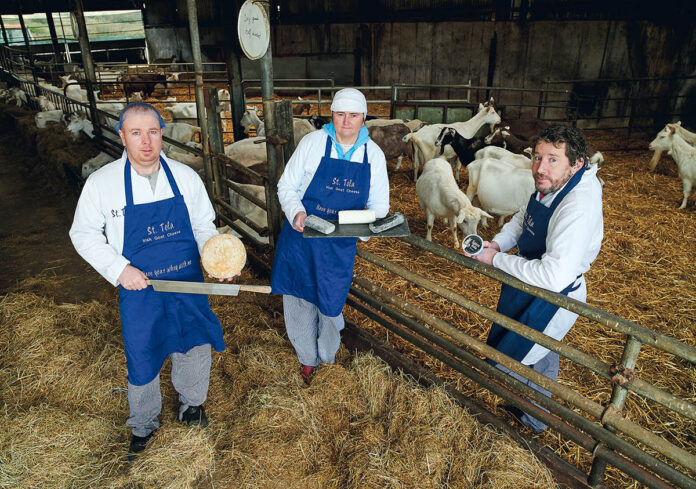The importance of locally-produced food has been underlined by the pandemic, says St Tola’s Siobhán Garvey tells Conor Clohessy
FROM fresh crottin to classic logs, Greek style to hard, Siobhán Ní Gháirbhith and the team at Inagh Farmhouse Cheese have been producing St Tola Goat Cheese for well over 20 years.
Near the village of Inagh, St Tola was originally established by Meg and Derrick Gordan on their 25-acre farm in the early 1980s; since 1999, Siobhán has been continuing their legacy on her own farm, which she inherited from her parents.
Siobhán recalls buying goat’s milk from the Gordans growing up, because her family would use it as a home treatment for the asthma that her sisters Róisín and Sinéad suffered with from an early age.
She said: “I was a primary school teacher in Galway and my parents were also teachers, leasing out our land to neighbours. I thought it was a pity we weren’t using the land.
“It was fortuitous because Meg and Derrick were retiring, and they had no two-legged kids; they had lots of four-legged ones! John, my partner in life and in business, encouraged me to take the business over.”
Siobhán continued that while St Tola was traditionally present in hotels and restaurants, the range that Inagh Farmhouse produces has continually expanded into retail over the years, especially with how the pandemic has impacted the hospitality sector.
However, the lockdown also caused a shift in how many smaller local businesses began to stock St Tola, with customers only able to travel within a certain distance of their homes.
This extra business compounded with Tesco, Dunnes Stores and SuperValu allowed St Tola to continue expanding throughout the pandemic.
Siobhán added: “People began to realise the importance of supporting local food and produce. But even if we hadn’t had the pandemic, I think that the way things are going with world population growth is causing people to think about their sources and how reliable they are. Local cheese producers have definitely benefitted from that.”
Inagh Farmhouse branched out into farm tours a few years ago. Situated between the Cliffs of Moher and Bunratty Castle, the farmhouse was often stumbled upon by curious tourists who followed the sign on the main road directing deliveries towards the farm.

Siobhán saw this as yet another opportunity to expand, and while the tours began as a tourist attraction, the farmhouse is now visited often by culinary students from the likes of Galway Mayo Institute of Technology (GMIT).
She added that the tours are a very sustainable and reliable in the long-term, things that have always been important to Siobhán in business.
She is particularly aware of how much business she can do locally, to reduce the company’s carbon footprint and minimise its effect on the environment.
“I’m not a believer in flying products or people around the world. In a country like ours, we should be able to grow, buy and eat our own food. You can fly in what looks like cheap food from abroad, but when you really look at it, it’s not cheap at all, and it’s not healthy either.”
Inagh Farmhouse Cheese has always preferred quality over quantity, Siobhán continued, wishing to make use of the farm in life and in work instead of moving onto bigger pastures to produce more and more with each successful year.
In line with its vision to reduce its carbon footprint, each of the nine employees at the farmhouse live locally and most of them can walk to work.
Siobhán emphasised that during the pandemic, it is paramount that businesses learn what is sustainable, and although Inagh Farmhouse is small, she admits that she prefers it that way.
Siobhán continued: “Small is useful, in my eyes. We’ve brought our customers with us throughout the years, so we’re not just producing fresh cheese out the door, we’re producing different kinds of cheeses with each customer in mind.
“St Tola would be seen as one of the leading goat’s cheeses in the country, which is an achievement given that it is heavily reliant on the West Clare area and isn’t something that can be mass-produced.”
It was this philosophy that saved Inagh Farmhouse from feeling the same effects of Brexit as larger companies, even though St Tola is exported in smaller quantities to the United Kingdom – namely to a new customer in Scotland who contacted the farmhouse during the pandemic, as well as higher-end customers in London.
Although the international market isn’t Siobhán’s focus, the Inagh Farmhouse is part of an organisation called Economusée, a Canadian-born society of craftspeople who celebrate and adapt their traditional methods of production without letting the old ways die off.
As part of that movement, Inagh Farmhouse will be reopening their on-site museum this summer, showcasing the history of cheese-making and focused on the practice of crafting raw milk cheese, a method not employed by many producers in the country anymore.
“Our history is very important, as is our future. Teaching traditional craft keeps it alive, and the museum helps us share our story and our plan for the future with our customers. Food is something we’ll always need, and we’ve had our fair share of scares with beef and pork. It’s better to know the farm from which your food is produced.”
Inagh Farmhouse will be hiring a new employee this year, hoping to add a new member to their ranks from the local area.
In the meantime, St Tola continues to remind us just how indigenous dairy companies have always been a backbone of Irish society and have kept the country going, through many a challenge.

